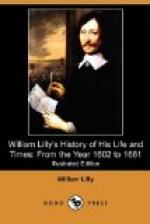Dean Owen of Christ’s-Church in Oxford, also in his sermons had sharp invectives against me and astrology; I cried quittance with him, by urging Abbot Panormitan’s judgment of astrology contrary to Owen’s, and concluded, ‘An Abbot was an ace above a Dean.’
One Mr. Nye of the assembly of divines, a Jesuitical Presbyterian, bleated forth his judgment publickly against me and astrology: to be quit with him, I urged Causinus the Jesuit’s approbation of astrology, and concluded, Sic canibus catulos, &c.
In some time after the Dutch Ambassador being offended with some things in Anglicus, presented a memorial to the Council of State, that Merlinus Anglicus might be considered, and the abuses against their nation examined; but his paper was not accepted of, or I any way molested.
In Oliver’s Protectorship, I wrote freely and satyrical enough: he was now become Independant, and all the soldiery my friends; for when he was in Scotland, the day of one of their fights, a soldier stood with Anglicus in his hand; and as the several troops passed by him, ’Lo, hear what Lilly saith; you are in this month promised victory, fight it out, brave boys;’ and then read that month’s prediction.
I had long before predicted the downfall of Presbytery, as you (most honoured Sir) in the figure thereof, in my Introduction, may observe; and it was upon this occasion. Sir Thomas Middleton of Chark Castle, enemy to Presbytery, seeing they much prevailed, being a member of the House, seriously demanded my judgment, if Presbytery should prevail, or not, in England? The figure printed in my Introduction, will best give you an account, long before it happened, of the sinking and failing of Presbytery; so will the second page of my Hieroglyphicks. Those men, to be serious, would preach well; but they were more lordly than Bishops, and usually, in their parishes, more tyrannical than the Great Turk.
* * * * *
OF THE YEAR 1660; THE ACTIONS WHEREOF, AS THEY WERE REMARKABLE IN ENGLAND, SO WERE THEY NO LESS MEMORABLE AS TO MY PARTICULAR FORTUNE AND PERSON.
Upon the Lord General Monk’s returning from Scotland with his army into England, suddenly after his coming to London, Richard Cromwell, the then Protector’s, authority was laid aside, and the old Parliament restored; the Council of State sat as formerly. The first act they put the General upon was, to take down the city gates and portcullisses, an act which, the General said, was fitter for a Janizary to do than for a General; yet he effected the commands received, and then lodged in the city with his army. The citizens took this pulling down of their gates so heinously, that one night the ruder sort of them procured all the rumps of beef, and other baggage, and publickly burnt them in the streets, in derision of the then Parliament, calling them that now sat, The Rump. This hurly-burly




